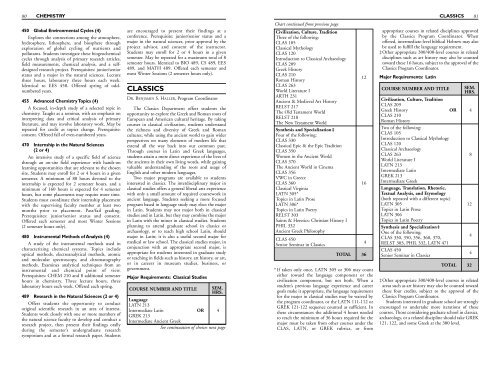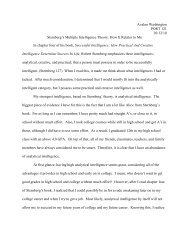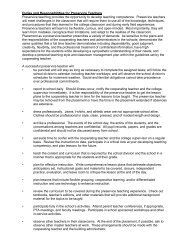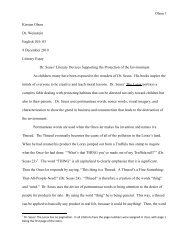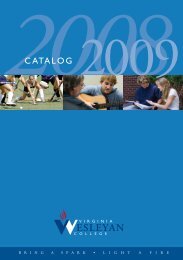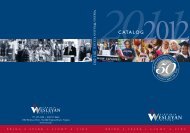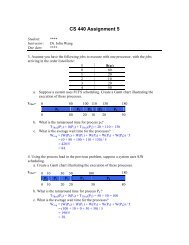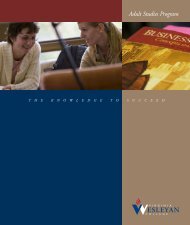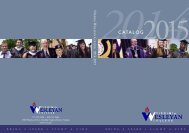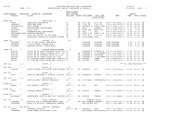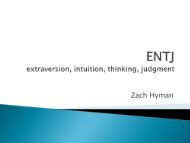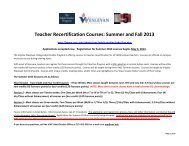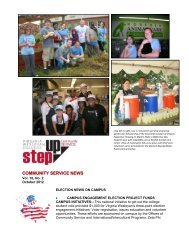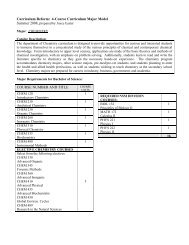80 CHEMISTRYCLASSICS81450 Global Environmental Cycles (4)Explores the connections among the atmosphere,hydrosphere, lithosphere, and biosphere throughexploration of global cycling of nutrients andpollutants. Students investigate these biogeochemicalcycles through analysis of primary research articles,field measurements, chemical analysis, and a selfdesignedresearch project. Prerequisites: junior/seniorstatus and a major in the natural sciences. Lecturethree hours, laboratory three hours each week.Identical to EES 450. Offered spring of oddnumberedyears.455 Advanced Chemistry Topics (4)A focused, in-depth study of a selected topic inchemistry. Taught as a seminar, with an emphasis oninterpreting data and critical analysis of primaryliterature, and may involve laboratory work. May berepeated for credit as topics change. Prerequisite:consent. Offered fall of even-numbered years.470 Internship in the Natural Sciences(2 or 4)An intensive study of a specific field of sciencethrough an on-site field experience with hands-onlearning opportunities that are relevant to the chosensite. Students may enroll for 2 or 4 hours in a givensemester. A minimum of 80 hours devoted to theinternship is expected for 2 semester hours, and aminimum of 160 hours is expected for 4 semesterhours, but some placements may require more time.Students must coordinate their internship placementwith the supervising faculty member at least twomonths prior to placement. Pass/fail grading.Prerequisites: junior/senior status and consent.Offered each semester and most Winter Sessions(2 semester hours only).480 Instrumental Methods of Analysis (4)A study of the instrumental methods used incharacterizing chemical systems. Topics includeoptical methods, electroanalytical methods, atomicand molecular spectroscopy, and chromatographymethods. Examines analytical techniques from aninstrumental and chemical point of view.Prerequisites: CHEM 210 and 8 additional semesterhours in chemistry. Three lecture hours, threelaboratory hours each week. Offered each spring.489 Research in the Natural Sciences (2 or 4)Offers students the opportunity to conductoriginal scientific research in an area of interest.Students work closely with one or more members ofthe natural science faculty to develop and conduct aresearch project, then present their findings orallyduring the semester’s undergraduate researchsymposium and as a formal research paper. Studentsare encouraged to present their findings at aconference. Prerequisite: junior/senior status and amajor in the natural sciences, prior approval by theproject advisor, and consent of the instructor.Students may enroll for 2 or 4 hours in a givensemester. May be repeated for a maximum total of 8semester hours. Identical to BIO 489, CS 489, EES489, and MATH 489. Offered each semester andmost Winter Sessions (2 semester hours only).CLASSICSDR. BENJAMIN S. HALLER, Program CoordinatorThe Classics Department offers students theopportunity to explore the Greek and Roman roots ofEuropean and American cultural heritage. By takingcourses in classical civilization, students understandthe richness and diversity of Greek and Romancultures, while using the ancient world to gain widerperspectives on many elements of modern life thatextend all the way back into our common past.Through courses in Latin and Greek languages,students attain a more direct experience of the lives ofthe ancients in their own living words, while gainingvaluable understanding of the roots and usage ofEnglish and other modern languages.Two major programs are available to studentsinterested in classics. The interdisciplinary major inclassical studies offers a general liberal arts experiencewith only a small amount of required coursework inancient language. Students seeking a more focusedprogram based in language study may elect the majorin Latin. Students may not major both in classicalstudies and in Latin, but they may combine the majorin Latin with the minor in classical studies. Studentsplanning to attend graduate school in classics orarchaeology, or to teach high school Latin, shouldmajor in Latin; it is also a useful second major formedical or law school. The classical studies major, inconjunction with an appropriate second major, isappropriate for students interested in graduate studyor teaching in fields such as history, art history, or art,or in careers in museum studies, business, orgovernment.Major Requirements: Classical StudiesCOURSE NUMBER AND TITLE SEM.HRS.LanguageLATN 213Intermediate Latin OR 4GREK 213Intermediate Ancient GreekSee continuation of choices next pageChart continued from previous pageCivilization, Culture, TraditionThree of the following:CLAS 105Classical MythologyCLAS 120Introduction to Classical ArchaeologyCLAS 209Greek HistoryCLAS 21012Roman HistoryCLAS 263World Literature IARTH 231Ancient & Medieval Art HistoryRELST 217The Old Testament WorldRELST 218The New Testament WorldSynthesis and Specialization‡Four of the following:CLAS 330Classical Epic & the Epic TraditionCLAS 350Women in the Ancient WorldCLAS 370The Ancient World in CinemaCLAS 356VWC in GreeceCLAS 360 16Classical <strong>Virginia</strong>LATN 305*Topics in Latin ProseLATN 306*Topics in Latin PoetryRELST 303Saints & Heretics: Christian History IPHIL 332Ancient Greek PhilosophyCLAS 4504Senior Seminar in ClassicsTOTAL 36* If taken only once, LATN 305 or 306 may counteither toward the language component or thecivilization component, but not both. When astudent’s previous language experience and careergoals make it appropriate, the language requirementfor the major in classical studies may be waived bythe program coordinator, or the LATN 111-112 orGREK 121-122 sequence counted as sufficient. Inthese circumstances the additional 4 hours neededto reach the minimum of 36 hours required for themajor must be taken from other courses under theCLAS, LATN, or GREK rubrics, or fromappropriate courses in related disciplines approvedby the Classics Program Coordinator. Whenoffered, intermediate-level biblical Hebrew may alsobe used to fulfill the language requirement.‡Other appropriate 300/400-level courses in relateddisciplines such as art history may also be countedtoward these 16 hours, subject to the approval of theClassics Program Coordinator.Major Requirements: LatinCOURSE NUMBER AND TITLE SEM.HRS.Civilization, Culture, TraditionCLAS 209Greek History OR 4CLAS 210Roman HistoryTwo of the following:CLAS 105Introduction to Classical MythologyCLAS 120Classical ArchaeologyCLAS 263 8World Literature ILATN 213Intermediate LatinGREK 213Intermediate GreekLanguage, Translation, Rhetoric,Textual Analysis, and Etymology(both repeated with a different topic)LATN 305 12Topics in Latin ProseLATN 306Topics in Latin PoetrySynthesis and Specialization‡One of the following:CLAS 330, 350, 356, 360, 370,4RELST 303, PHIL 332, LATN 471CLAS 450Senior Seminar in Classics4TOTAL 32‡Other appropriate 300/400-level courses in relatedareas such as art history may also be counted towardthese four credits, subject to the approval of theClassics Program Coordinator.Students interested in graduate school are stronglyencouraged to undertake more iterations of thesecourses. Those considering graduate school in classics,archaeology, or a related discipline should take GREK121, 122, and some Greek at the 300 level.
82 CLASSICSCLASSICS83Minor Requirements: Classical Studies(Latin or Greek)COURSE NUMBER AND TITLEThree courses designated CLAS,LATN, or GREKTwo other courses designated CLAS,LATN, or GREK or other coursesabout the ancient world, as approvedby the program coordinator.SEM.HRS.128TOTAL 20**At least 12 of the 20 semester hours must be at the300-400 level.Minor Requirements: LatinCOURSE NUMBER AND TITLESEM.HRS.Three courses in Latin (at least two at12300/400 level)Two courses from either Latin or Greekor courses in art history, religious studies,philosophy as approved by the department 8coordinator. (One course must be atthe 300/400 level.)TOTAL 20CLASSICS COURSES (CLAS)105 Classical Mythology (4) VExplores methods of interpreting myths in theiroriginal contexts and affirms the continued relevanceof mythology in modern society. Readings includeHomer, Hesiod, Sappho, Aeschylus, Sophocles,Euripides, Plato, Aristotle, Virgil, and Ovid. Offeredeach fall.120 Introduction to Classical Archaeology (4)Introduces students to the methods common toboth Old and New World archaeology, followed byan introduction to and interpretation of the materialremains of the ancient Greek, Roman, andMediterranean worlds. Offered on demand.209 Greek History (4) HUses readings in primary sources to portray life inancient Greece for its own intrinsic interest and for itsrelevance to today’s world. Special attention is givento the first writers of history and to the developmentof Athenian democracy.210 Roman History (4) HUses wide-ranging sources from history, literature,and archaeology to explore Roman civilization fromits earliest beginnings, through the period ofRepublican expansion and transition into a vastempire, concluding with the Empire’s ultimatedecline and dissolution. Special attention is given toRoman historiography and to the political changesfrom Republic to Empire.263 World Literature I (4) TA chronological survey of major literary worksfrom Ancient Near Eastern Epic to the EuropeanMiddle Ages. Emphasizes the close reading of ancientliterature within its immediate cultural context andthe analysis of this literature in well-argued papers.Prerequisite: ENG 105 with a grade of C or higher.Identical to ENG 263. Offered when circumstancespermit.264 World Literature II (4) TA survey of major works in world literature fromthe Renaissance to the present day emphasizing textsoutside the British and American traditions.Particular attention is given to texts that putthemselves in dialogue with Ancient Near Easternand Classical Greek and Roman literary traditions.Prerequisite: ENG 105 with a grade of C or higher.Identical to ENG 264. Offered when circumstancespermit.330 Classical Epic and theEpic Tradition (4)WA study of epic works from the ancientMediterranean and other cultures. Potential topicsinclude Roman epic, Ancient epic, J.R.R. Tolkien andthe epic tradition, and the oral-traditional epic. Maybe repeated for credit if topics vary.350 Women in the Ancient World (4) WExamines gender roles and sexual identities inancient Greece and Rome through readings inprimary sources supplemented by current scholarship.Explores contrasts between representations of womenin Classical literature and the limitations theyhistorically faced and the changes that occurred inwomen’s status according to place and time.356 Classical Studies Abroad HTravel to a relevant area within the cultural orbitof ancient Greece and Rome for on-site study ofancient Greco-Roman history and literary andmaterial culture.360 Classical <strong>Virginia</strong> (4) HAn exploration of how classical narratives ofexploration, political thought, literature, and art andarchitecture helped to shape the culture of the state of<strong>Virginia</strong>. Offered Winter Session when circumstancespermit.370 The Ancient World in the Cinema (4) AStudies how ancient Greece and Rome continueto interest and influence us through the modernmedium of cinema. Includes readings of selectedclassical texts and comparisons with modern screentreatments. Attention is given both to moderncinematic adaptations of ancient literary works and toepic “historical” spectacles. Examines directorialcreativity, audience expectation, historical accuracy,and modern myth-making.450 Senior Seminar in Classics (4) I,WOffers students the opportunity to do sustainedresearch on a chosen topic and to present the resultsin a substantial (20-30 page) piece of work. Uponcompletion of the project, students present their workin a public oral defense. Prerequisites: successfulcompletion of ENG 105 with a grade of C or higherand senior status, with a major in Classical Studies orLatin. Offered annually as needed.GREEK COURSES (GREK)121 Beginning Ancient Greek I (4)An introduction to the grammar, syntax, andvocabulary of ancient Greek. Completion of the yearlongsequence prepares students to read connectedpassages in ancient texts such as the dialogues of Platoor the New Testament; emphasis on Attic Greek orKoine dialects varies according to the instructor andinterest of the class. Does not count toward theforeign language requirement. Offered on demand.122 Beginning Ancient Greek II (4)An introduction to the grammar, syntax, andvocabulary of ancient Greek. Completion of the yearlongsequence prepares students to read connectedpassages in ancient texts such as the dialogues of Platoor the New Testament; emphasis on Attic Greek orKoine dialects varies according to the instructor andinterest of the class. Does not count toward theforeign language requirement. Offered on demand.213 Intermediate Ancient Greek (4)Begins with a thorough review of basic Greekgrammar as covered in GREK 121-122. Studentsthen undertake extended readings in an ancientGreek text such as the New Testament or theDialogues of Plato. Emphasizes translation andreading skills rather than speaking/listening skills.Prerequisite: GREK 122 with a grade of C or higheror placement. Offered on demand.LATIN COURSES (LATN)111 Beginning Latin I (4)Introduces the elements of the language of theAncient Romans: vocabulary, syntax, and grammar.Students learn how to translate sentences and shortstories. Focuses on translation and reading skills.Offered each year.112 Beginning Latin II (4)Introduces the elements of the language of theAncient Romans: vocabulary, syntax, and grammar.Students learn how to translate sentences and shortstories. Focuses on translation and reading skills.Prerequisite: LATN 111. May be used towardfulfillment of the language requirement. Offered eachyear.213 Intermediate Latin (4)Introduces students to advanced grammar as theyread a real Latin text such as the poems of Catullus orthe speeches of Cicero. The primary goal is to gainfacility in reading Latin, but the course alsointroduces students to ancient Roman literaryaesthetics and culture. Focuses on translation andreading skills rather than speaking/listening skills.May be used toward fulfillment of the languagerequirement. Prerequisite: LATN 112 or equivalent.Offered each year.305 Topics in Latin Prose (4)Reading and translation from one or more Latinprose authors arranged by author (e.g., Apuleius) orby topic or genre (e.g., the Roman novel, Arthurianlegends, etc.). May be repeated for credit as the topicvaries. Prerequisite: LATN 213 or placement. Offeredon demand.306 Topics in Latin Poetry (4)Reading and translation from one or more Latinpoets, arranged by author (e.g., Virgil) or by topic orgenre (e.g., lyric, epic). May be repeated for credit asthe topic varies. Prerequisite: LATN 213 orplacement. LATN 305 is not a prerequisite. Offeredon demand.471 Practicum in the Teaching of Latin (4)A workshop that introduces advanced students ofLatin to current teaching methods in the language.Students serve as assistants in Elementary Latin whilemeeting regularly with the instructor to gain handsonexperience in the practical aspects of teachingLatin. Ordinarily taken in the semester prior toEDUC 445/446. Prerequisites: LATN 305 or 306and consent. Offered on demand.


